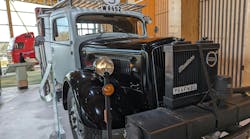Company: Gateway Tankers; St. Louis, Mo.
Operation:On-site fleet fueling; Scott Thomlison, president
Problem: Gateway Tankers began operating in October last year with seven fuel tanker trucks. The new company was formed to provide on-demand, on-site refueling service to customers in the metropolitan St. Louis area. While one-half of its business is truck fleet refueling, Gateway also fuels light and heavy off-road equipment.
From the start, Gateway Tankers president Scott Thomlison says he knew he wanted a completely automated fueling system. "In the liquid fuel industry, most companies still provide service the old-fashioned way, with mechanical meters, cardboard tickets, and handwritten ledgers and receipts," he explains.
Although the method works, it's certainly not the quickest or most efficient. Tanker operators end up spending a significant amount of time on paperwork and administrative tasks rather than customer service. There's too much room for error, and stolen fuel is always a possibility.
Solution: A coast-to-coast search by Thomlison for the best automated fueling system for the new Gateway Tankers operation turned up TouchStar Technologies (www.touchpc.com). TouchStar, he notes, not only had a useful and technologically advanced product, but, as a unit of Williams Energy Group, had "big company" backing behind them for superior customer service and tech support.
The TouchStar system is comprised of a TouchPC handheld computer, EMH500 Electronic Registers, and FuelPac fuel delivery software. The TouchPC computer is about the size of a videocassette and has a user-friendly touch-sensitive screen. It's mounted in the truck's cab in a cradle that is connected to the EMH500 Electronic Registers.
The EMH500 meter head measures fuel dispensed into each piece of equipment as well as total fuel dispensed for the customer. The registers and cradle are also connected to a 4-in. thermal printer that operators use for producing meter data information and customer receipts.
On-site drivers use the TouchPC screen to bring up customer information, including name, address, every vehicle in the fleet, what type of fuel goes into each vehicle (on- or off-road diesel or gasoline), payment and delivery histories, etc.
The handheld computer also includes integrated peripherals to support mobile computing applications. "By plugging it into a modem from home at the end of their work shifts, operators can download the day's transactions to Gateway's office computer system, enabling us to start the billing process immediately," reports Thomlison.
"Customers also benefit from the automated system," he adds. "The printed receipts itemize everything done for them during a visit, and invoices sent to them summarize each vehicle's fuel usage for the billing cycle."
Customers also appreciate the built-in safeguards of an automated system. Fuel simply cannot be dispensed without being tracked by the EMH500 registers and TouchPC computer. Thomlison notes the rapidly growing on-site refueling company will be adding four more tankers to its fleet this year, all of which will include the TouchStar system.


